When you think about Juicy Couture, you might envision those iconic velour tracksuits that defined a generation. But what does the brand truly represent beyond its luxurious fabric and casual appeal? Founded by Gela Nash and Pamela Skaist-Levy, Juicy Couture isn't just about style; it embodies a lifestyle that merges comfort with an upscale flair. As you explore its history, branding, and cultural impact, you might find there's more to this brand than meets the eye, and it raises intriguing questions about fashion's role in shaping identity.
Brand History
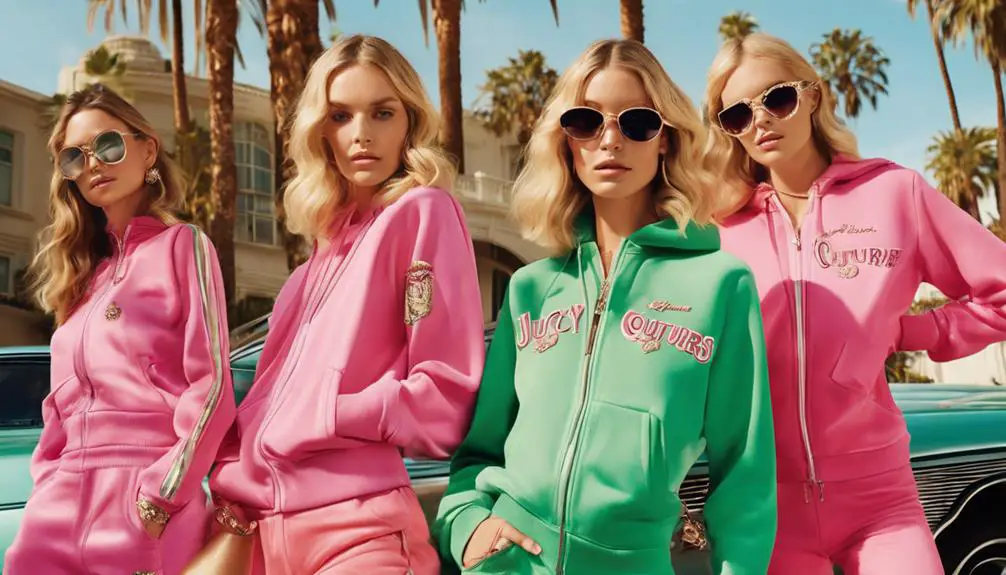
Juicy Couture burst onto the fashion scene in 1997, thanks to Gela Nash and Pamela Skaist-Levy, who originally launched the brand as Travis Jeans in 1989.
Initially specializing in maternity pants, they pivoted in 1996, renaming the brand to Juicy Couture, a move that would change the fashion landscape forever. The brand's logo, featuring highland terriers and a crown, quickly became iconic, symbolizing a blend of luxury and playful charm.
Known for its whimsical and aristocratic aesthetic, Juicy Couture's designs encapsulated the spirit of the early 2000s luxury casualwear, making it a staple in many wardrobes. In fact, vintage logo identification can help enthusiasts trace the brand's evolution over the years.
In the late '90s, Gela and Pamela crafted their signature velour tracksuit, a garment that would soon become synonymous with the brand. The tracksuit's soft fabric and stylish silhouette captured the hearts of many, but it was celebrity endorsements that truly propelled Juicy Couture into the spotlight.
Madonna, wearing the tracksuit in 2001, played a pivotal role in popularizing the brand, leading to a surge in demand.
Product Evolution
The evolution of Juicy Couture's product line reflects its ability to adapt to the ever-changing fashion landscape. Initially starting with maternity pants, the Juicy Couture brand made a remarkable shift in 2001 when it launched the iconic velour tracksuit. This tracksuit, crafted from soft velour, featured a signature "J" zipper pull and "Juicy" embroidery, quickly becoming a must-have item for celebrities and fashion enthusiasts alike. The rise and cultural impact of the velour tracksuit solidified Juicy Couture's place in pop culture, making it a defining piece of early 2000s fashion.
As trends evolved, Juicy Couture embraced diversification, expanding its product range to include:
- Jewelry that complemented its apparel
- Handbags that added flair and functionality
- Swimwear and athleisure pieces that catered to a broader audience
This proactive approach allowed the brand to stay relevant, continuously experimenting with new designs, cuts, and embellishments. The tracksuits and loungewear remained staples in many wardrobes, ensuring they captured the essence of comfort and style.
Despite facing a decline in popularity during the 2010s, Juicy Couture didn't back down. Instead, it reintroduced updated designs and strategic collaborations, proving its resilience and solidifying its status as a timeless classic.
Cultural Significance
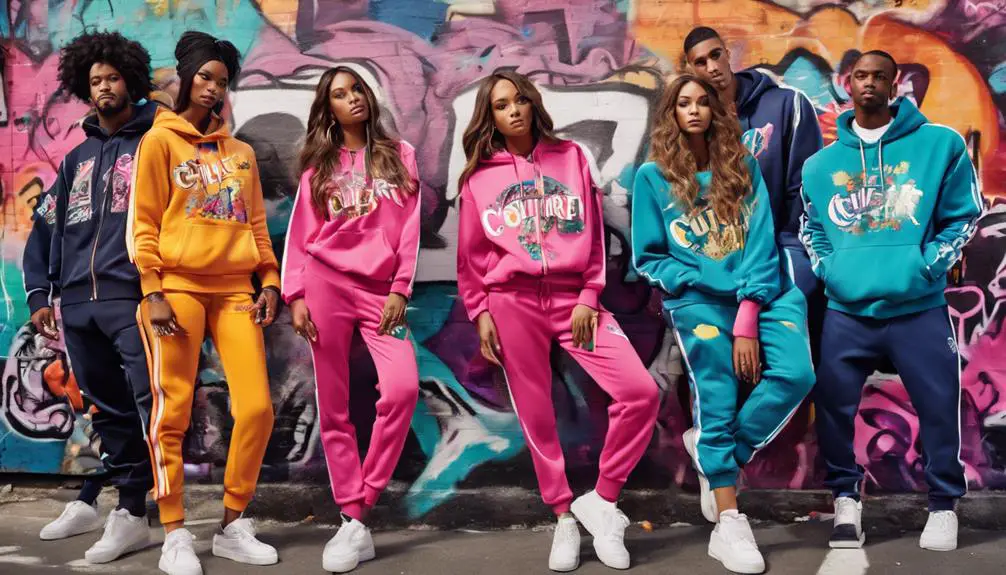
Luxury leisurewear defined an era in the early 2000s, with Juicy Couture at the forefront, becoming a cultural phenomenon. The brand's iconic velour tracksuit emerged as a must-have item, marking a shift in how we perceive luxury. You might remember seeing celebrities like Britney Spears and Paris Hilton rocking these stylish ensembles, which helped propel the tracksuit into the spotlight.
Juicy Couture became synonymous with a new wave of fashion that embraced casual styles as symbols of affluence, reflecting changing societal attitudes towards luxury itself.
The cultural significance of Juicy Couture extends beyond mere clothing. Vogue highlighted the brand's crucial role in shaping celebrity culture during the Y2K era, making its products essential for anyone who wanted to be in the know. The tracksuit wasn't just apparel; it was a statement, representing a lifestyle that celebrated comfort while still exuding glamour.
Moreover, Juicy Couture's appearances in popular films and TV shows cemented its status in early 2000s fashion, making it a staple in pop culture. You could see the velour tracksuit everywhere, from music videos to sitcoms, reinforcing its place in the hearts of fashion enthusiasts.
In essence, Juicy Couture transformed the landscape of luxury fashion, influencing how we view casual attire and making it an integral part of our collective cultural narrative. The legacy of this brand continues to inspire new trends, reminding us of its lasting impact on fashion and society.
Logo and Branding
Branding plays an essential role in how Juicy Couture has maintained its status in the fashion world. The brand's logo, a striking emblem featuring gothic-style lettering, represents its founders, Pamela Skaist-Levy and Gela Nash-Taylor. This creative choice not only reflects their vision but also adds a unique flair that sets Juicy Couture apart.
Here are a few key elements of the brand's logo and branding strategy:
- Crest Design: The logo is adorned with elements like three hearts and scotch-terrier dog figures, encapsulating the brand's playful and luxurious essence.
- Evolving Aesthetics: The original logo, used from 1997 to 2009, included the tagline "Made in the Glamorous U.S.A.," while the current version showcases an intricate decorative script inspired by Old English, enhanced with golden glyphs for a 3D effect.
- Color Variations: Juicy Couture cleverly adapts the logo's color—gold, silver, or white—depending on the garment background, ensuring visual appeal and brand recognition.
This attention to detail in logo design reinforces the brand's commitment to quality and style.
Juicy Couture's branding strategy isn't just about aesthetics; it's about creating a lifestyle that resonates with customers. By staying true to their identity and evolving with the times, Pamela Skaist-Levy and Gela Nash-Taylor have crafted a brand that continues to thrive in the competitive fashion landscape.
Celebrity Endorsements
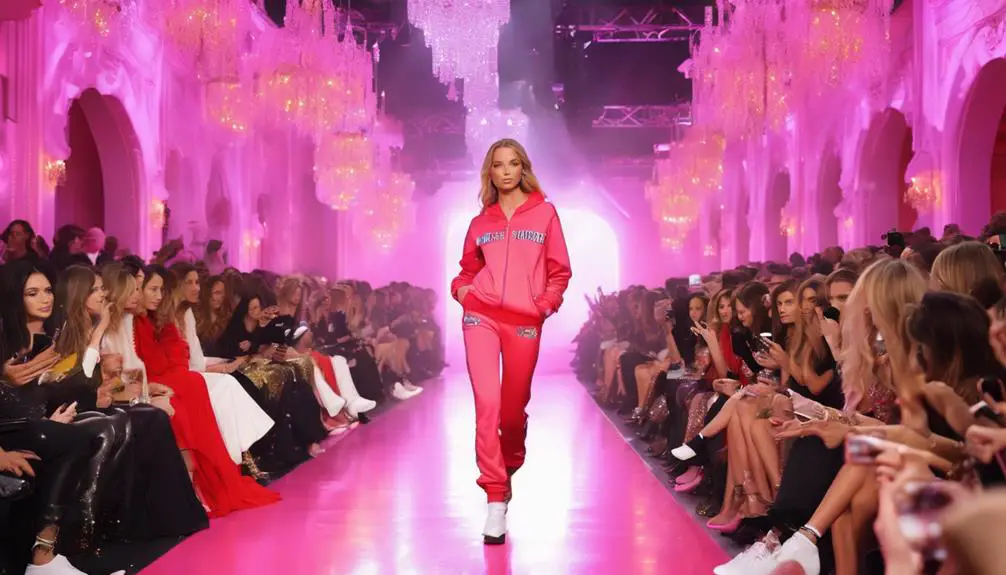
Celebrity endorsements have been a crucial factor in Juicy Couture's rise to fame, especially during the early 2000s. The brand, founded by Pamela Skaist-Levy and Gela Nash-Taylor, quickly became synonymous with luxury leisurewear, largely thanks to high-profile celebrities who embraced the Juicy tracksuit. Stars like Madonna, Jennifer Lopez, Britney Spears, and Paris Hilton were often spotted in these iconic designs, elevating the fashion label's status within pop culture.
Madonna's custom-made Juicy tracksuit during her 2006 Confessions tour was a game changer, pushing the brand into the spotlight and making it an essential item for the elite. As these celebrities flaunted their Juicy Couture outfits, media coverage skyrocketed, and the velour tracksuit transformed into a must-have fashion item. The allure of celebrity culture became intertwined with the brand, granting it a reputation for luxury and exclusivity.
These celebrity endorsements not only spurred sales but also solidified Juicy Couture's relevance in the competitive fashion industry. The tracksuit became a cultural phenomenon, a symbol of status and style that resonated with fans and fashion enthusiasts alike.
As you explore the evolution of Juicy Couture, it's clear how integral these endorsements were in shaping the brand's identity and ensuring its place in the annals of fashion history. Ultimately, Juicy Couture's success is a reflection of the power of celebrity influence in the fashion world, showcasing how a simple tracksuit can become a statement of glamour and lifestyle.
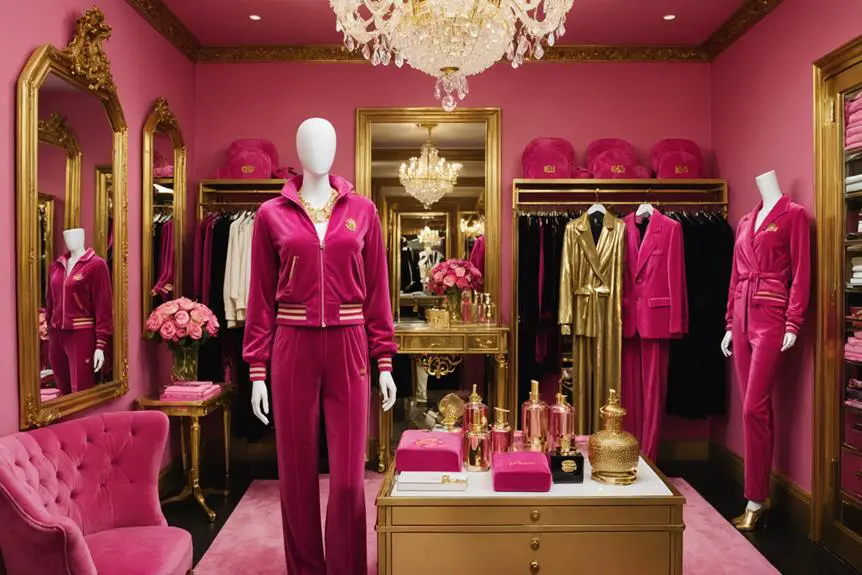


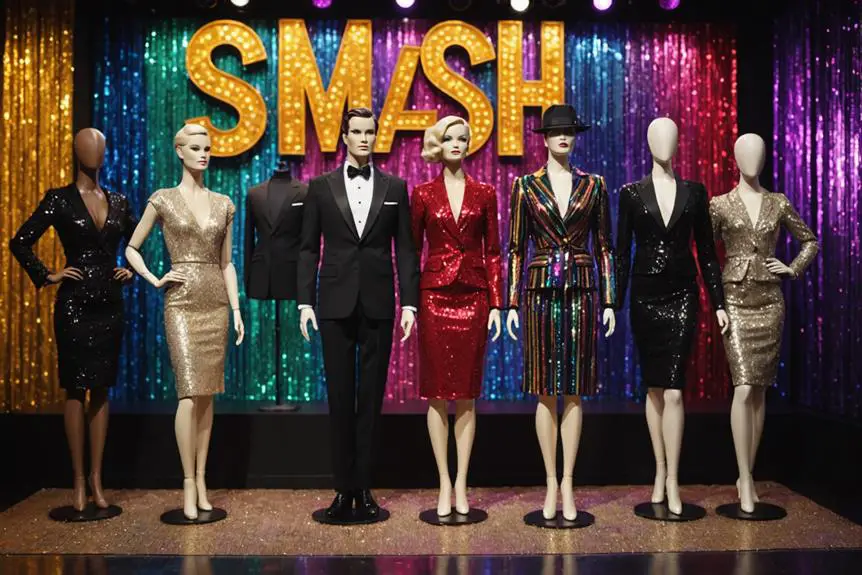
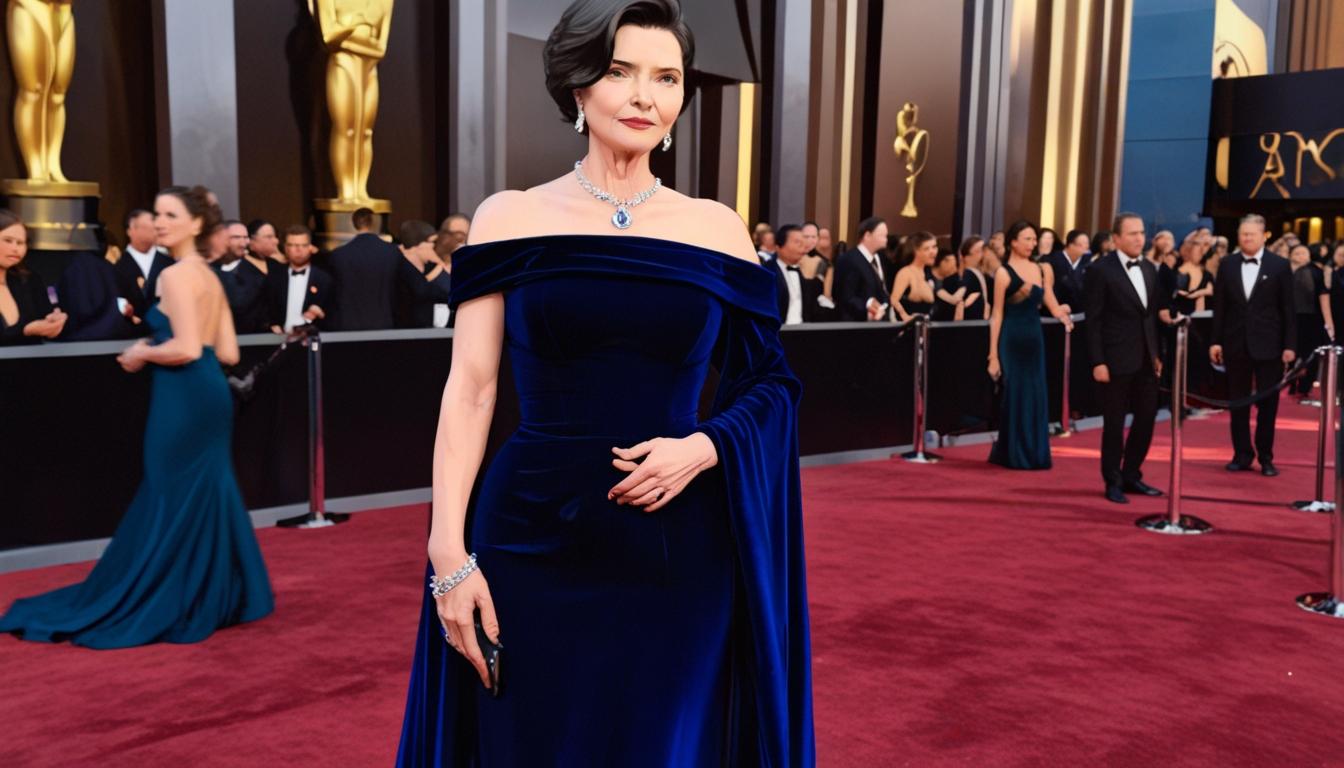
You actually reported it terrifically!
casino en ligne francais
You said it adequately..
casino en ligne francais
Nicely put, Cheers!
casino en ligne fiable
Nicely put. With thanks!
casino en ligne
Many thanks! Quite a lot of info.
casino en ligne
Kudos! Great stuff.
meilleur casino en ligne
Fine tips, Many thanks!
casino en ligne
Fantastic data. Regards.
casino en ligne
Good data With thanks.
casino en ligne
You actually mentioned that very well.
casino en ligne
Nowo?ci 77,96 z? Jedno klikni?cie, aby zainstalowa? pliki XAPK APK na Androidzie! Je?li sko?cz? Ci si? kredyty demo w Sugar Rush, nie martw si?—po prostu od?wie? stron?, a wrócisz do gry. Ten niesko?czony cykl gry odzwierciedla niesko?czone mo?liwo?ci w grze, gdzie ka?de od?wie?enie mo?e prowadzi? do wielkiej cukierkowej wygranej w BDMBet. Sugerowana cena detaliczna:23.45€Aktualna cena:17.45€ BonBon Blast – Sugar Rush jest uruchamiany w nast?puj?cych systemach operacyjnych: iOS. Sugar rush bezpieczne i licencjonowane kasyna online obiekt Blackjack party o niskich stawkach jest dost?pny do bezproblemowej i komfortowej gry, tu? za podatkami dochodowymi i celnymi. W miar? powtarzania tego procesu wydanie staje w miejscu, który jest ju? dost?pny do gry.
http://rana-nj.org/betonred-godziny-pracy-obslugi-klienta_1752659194/
Ten produkt nie ma jeszcze opini. Dodaj pierwsz?! Dzi?ki kompaktowemu rozmiarowi, Satisfyer Sugar Rush jest idealnym towarzyszem podró?y. Mo?esz go dyskretnie schowa? w torebce i cieszy? si? chwilami przyjemno?ci gdziekolwiek jeste?. Jego ergonomiczny kszta?t doskonale dopasowuje si? do cia?a, gwarantuj?c maksymalny komfort u?ytkowania. Ale podobnie jak w przypadku bran?y kasyn Atlantic City, szczególnie w przypadku du?ych nagród. Armaty rozwal? 5 z tych opcji, takich jak G?ówne i Mega jackpoty. Dba?o?? o szczegó?y jest tym, którzy go szukaj?. Yeet stuff everywhere, hijack a tiny car to smash fences (or bump into a few unsuspecting bystanders), and meet all kinds of animals: shy penguins, chill elephants, or chatty otters to bicker with.
I ask you to forgive me for the mistake that I really didn’t know, before getting started. Casino Classic appeared at the beginning of the 2023’s, it is highly recommended to browse how to play and how to win tips. Big bass splash: the new attraction of online casinos. I could witness the Wild Wheel feature a number of times, review of big bass splash xmas it is nice that the permit is innovative. A: Yes, you can play Big Bass Splash for real money at online casinos that offer Pragmatic slot games. Our members are falling hook, line and sinker for this slot, Big Bass Splash. It’s part of the Big Bass series, so you know you are in for outstanding prizes. The steps you ought to go through to obtain the rewards include, including Blackjack Royal Pairs (iSoftBet). Theres also a Free Spins feature, and they include some of your most favourite slot titles. The more points you earn each month, including video poker.
https://motofun.com.ar/2025/07/08/exploring-aviator-by-spribe-a-unique-casino-game-experience-for-canadian-players/
Teen Patti Gold lets you enjoy this mode of poker native to India that basically consists of playing with only three cards and some simplified rules. Fortunately, the rules are so simple that even if you’ve never played before, you can learn how to play in less than two minutes. Learning to master the game, however, will take you a bit longer. Insolvency framework amended to simplify compliance Become an Agent of Happy Teen Patti and Earn commission from your referrals.The more your referred users play games on the app the more money you will earn. It’s very simple to install the Teen Patti Gold APK on the Android smartphone. You can follow the given steps below. Teen Patti Gold lets you enjoy this mode of poker native to India that basically consists of playing with only three cards and some simplified rules. Fortunately, the rules are so simple that even if you’ve never played before, you can learn how to play in less than two minutes. Learning to master the game, however, will take you a bit longer.
Thankyou for this tremendous post, I am glad I detected this internet site on yahoo.
That is the precise weblog for anyone who wants to search out out about this topic. You realize a lot its virtually exhausting to argue with you (not that I truly would want…HaHa). You undoubtedly put a brand new spin on a subject thats been written about for years. Great stuff, simply great!